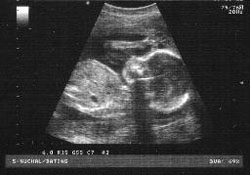I have no fear of Dolly, whose genes came
from the nucleus of a starved mammary cell,
or of tomatoes sprayed with gamma rays
to kill maggots, worms and Salmonella,
or of mice whose mutant myosin disrupts
the alignment of muscle fibers in the heart.
Nor do I fear the frog and carrot, cloned
from mature cells long ago, or the outdoors
where cosmic rays bombard my DNA
and radon gas emerges from the earth,
or people with hypertrophic cardiomyopathy,
whose heart cells are in disarray.
Should I fear grana stacks, where chlorophyll
molecules capture light in an oak leaf,
or the sunbeam itself—dancing photons
arriving after a long journey through space,
or the beat of my own heart, squeezing
blood one way through its four chambers?
I don't even fear the way neutrons
from a uranium nucleus cause fission
of a second nucleus, changing mass
to energy, making a chain reaction possible,
and certainly not the electrical signals
traveling like thoughts through silicon chips.
What I fear is the imperfection
of the human brain, quick to anger,
oblivious to the needs of frogs and carrots,
mice, oaks, sheep, confused by too much
or too little dopamine, unable to remember
clearly the color of manroot, the cry of geese.
